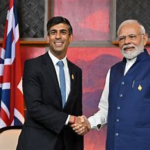
In a recent development, the Bharatiya Janata Party (BJP) has launched a scathing attack against Delhi Chief Minister Arvind Kejriwal over the Centre’s ordinance that reinstated the power to the Delhi Lieutenant Governor regarding the transfer and postings of officers in the national capital. The BJP accuses Kejriwal of attempting to take control of corruption in Delhi. The ordinance, which has stirred controversy, prompted strong reactions from senior BJP leaders during a press conference.
Union Minister Meenakshi Lekhi alleged that the controversy surrounding the ordinance stems from Kejriwal’s desire to exert control over corruption in the national capital. Lekhi emphasized that the reason for the uproar is Kejriwal’s intention to consolidate power in his hands. “The reason why this (Centre’s ordinance to create an authority for transfer and posting of Group-A officers in Delhi) has turned into a controversy is that the Delhi CM wants control on corruption,” she stated.
The BJP’s attack continued with Lok Sabha MP Manoj Tiwari highlighting Kejriwal’s meeting with opposition leaders to garner support against the ordinance in Rajya Sabha. Tiwari quoted Kejriwal as saying that he is willing to join forces with those he previously considered corrupt in order to defeat Prime Minister Narendra Modi and Home Minister Amit Shah. Tiwari further emphasized that Kejriwal’s priority is defeating the Centre, even if it means aligning with corrupt individuals.
Echoing the sentiment, BJP MP Harsh Vardhan accused Kejriwal of solely engaging in political tactics and hurling abuses at the Central government and the ruling party in the country. He criticized the Delhi Chief Minister for his divisive approach and lack of focus on governance.
The Congress party also joined in criticizing Kejriwal. Party leader Ajay Maken suggested that Kejriwal should adopt the “Sheila Dikshit model” of respectful engagement with officers, holding dialogues with them, and persuading them to work for the advancement of the city. Maken implied that mistreating officers goes against the ethos of effective governance.
The controversy originated from the Centre’s decision to introduce an ordinance establishing the National Capital Civil Service Authority. This authority will be empowered to recommend the transfer and posting of all Group A officers and officers from Delhi, Andaman and Nicobar, Lakshadweep, Daman and Diu, and Dadra and Nagar Haveli (Civil) Services (DANICS) serving in Delhi. The ordinance came in response to a Supreme Court ruling on May 11, which declared that the Delhi government has legislative and executive power over services in the national capital.
As the debate intensifies, Kejriwal’s efforts to control corruption and the ongoing power struggle between the Delhi government and the Centre are likely to remain in the spotlight. The clash between political parties reflects the deep-rooted ideological differences and the desire to exert influence over key administrative matters in Delhi.





